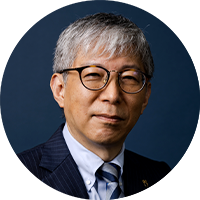Coach's VIEW is a business column authored by executive coaches in COACH A, aimed at providing valuable insights and effective approaches for leveraging coaching to foster organizational and leadership development. The column draws on the latest coaching trends and data, as well as insights from notable global publications on coaching.
How to Meet People Who Are "Conscious"

Yoshiki Ishikawa, a researcher on well-being, explains that it is important to treat people in a corporate environment as human beings instead of "human resources" or "human capital". (1)
According to Mr. Ishikawa, when any company starts out with a small number of employees, they recognize each other as people and think about how to be with each other. However, as the company grows in size, employees become a resource for the company and are treated as a sort of component. He says that in recent years, as symbolized by the term human capital, employees have become investment targets for the company.
In the midst of this trend, many corporations lack human connection among people who have mutual interest in and respect for each other. Employees feeling lonely, driven by mental illness are some of the consequences of this tendency. The loss of motivation and creativity that we feel on a daily basis, may also be the result of people forgetting that each of us is a "conscious" person.
What Can Be Gained by Thinking of "People" as "Things"
Indeed, people we face every day are people and not human resources or human capital. The definition of the word person, or being in human being, means someone who is conscious. On the other hand, the word resource in human resources implies a thing that you possess, that is consumable. The word capital in human capital also implies someone that just produces.
In other words, the words human resources and human capital may sound as if they deprive people of their individuality and uniqueness, and their anonymity and symbolic image may cause us to unconsciously treat people as objects. To be "conscious" means that we must understand that we have a variety of emotions and thoughts. In other words, each one of us is conscious in different ways.
However, in today's corporate environment, the emphasis on management performance is so huge that it turns into a mindset of prioritizing effectiveness and efficiency. In such an environment, it is too burdensome to assume that everyone is different, and it is convenient to objectify others.
We Sometimes Treat Others as "Objects" for Our Own Convenience
The reason why we treat people as objects is not only related to organizational problems, but to individual problems as well. In today's complex world that is lacking in answers, it is easy for us to fall into a state of uncertainty and anxiety. Furthermore, when we are uncertain about our own existence, we may treat others as objects.
For example, some people, when one lacks confidence, one becomes unusually arrogant towards others and tries to control them. By doing so, they make themselves think that they are capable. In other words, through arrogance, they are trying to gain some kind of momentary triumph.
This is counter to the idea of treating people as conscious beings. Rather, this is treating the other person as a "thing" in order to assert one's own existence. However, as mentioned at the beginning of this article, the more we objectify, the more it may lead us to think mechanistically, which means we lose our human faculties, like creativity and emotional intelligence. What then, should we value in order to have a better relationship with others?
How Meet People Who Are Conscious
Dialogue is one way to achieve this.
Dialogue is a relationship based on the understanding that each person has their own subjective view. Subjectivity is constructed based on past experiences and the ideas learned from those experiences.
Subjectivity is a person's unique way of observing and perceiving the world. Different views of the world naturally result in different ways of interacting. Even if they are in the same organization and doing the same job, each person experiences the world differently, depending on how they interact with the world. In other words, each person's experience is unique. In this regard, there is no exaggeration in saying that subjectivity = the person himself/herself.
The value of subjectivity is having the attitude of being curious about each other's differences and respecting each other's unique experiences. Then, those differences allow communication to generate new perspectives. This is Dialogue.
Dialogue is a way of relating with people, not as resources or objects, but as conscious beings with the awareness of their own subjectivity. Dialogue enhances self-awareness. Sharing differences with others and respecting each other's differences mean knowing one's own point of view and respecting its value. Knowing oneself more intimately will resolve uncertainty, and let one prepare to be in a state where one does not objectify the other.
Having said that, we live in an age of uncertainty, lacking in correct and immediate answers, where we need to liberate people from commodification and objectification, and treat them as individuals who are conscious. Through Dialogue, we continue to be curious and elevate each other.
We encounter people who are conscious through Dialogue.
REFERENCE:
Dialogue between Yoshiki Ishikawa and Daisuke Fujiwara, "Talking with Preventive Medicine Scientists, the Idea of 'Well-Being' for the Science of Happiness," KIRINto
*Regardless of profit, non-profit or intranet, secondary use such as copying, diversion, selling etc. is prohibited without permission.
Language: Japanese

